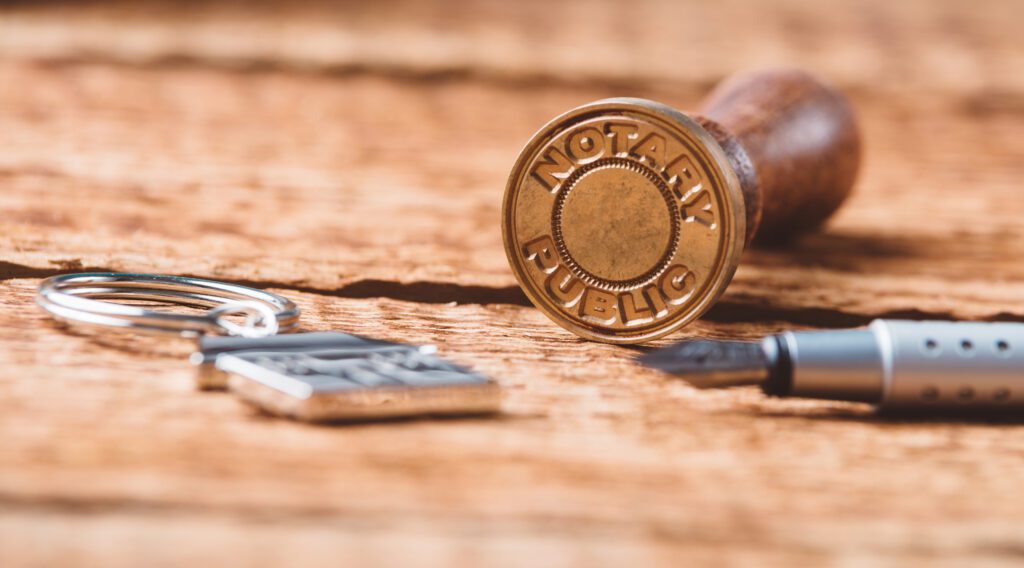
The notarization of documents or witnessing of signatures is perhaps the most basic and primary function of a notary public.
A notarized document is a document that has been certified in a particular way by a notary. There are many different types of documents that require notarization, but they usually fall into one of two categories: notarization of signatures and notarization of copies.
Some documents require your signature to be notarized when you sign them. This involves seeing a notary public in person and having them:
Some common examples of documents that require notarized signatures are:
The notary will sign the document, note where and when it was notarized, stamp it with the notary’s name and address, and then place a notarial seal on the document.
For the typical procedure on how we notarize signatures, please see below.
Making notarized copies, commonly called “certified copies” is another type of notarization.
This involves the notary looking at an original document, making a photocopy of that document, and then placing a special stamp on the photocopy that certifies it is a true copy of the original. The notary will then place a notarial seal on the document.
Some common examples of documents that notaries make certified copies of are:
Occasionally, notarized documents that will be used in a different country may require a further step called authentication.
Authentication is used to verify the signature, seal, and good standing of a notary public. In countries that are members of the Hague Convention, this is called an “apostille certificate”. Because Canada is not a member of the Hague Convention, we call this process “authentication”.
Authentication can involve various steps, depending on the requirements of the country where the document is heading:
If your document requires authentication, you need to find out what steps are required for the destination country.
There are certain types of documents that we cannot or will not witness or notarize:
We will not make certified (notarized) copies of a document unless we see the original document in person. Documents printed from your computer are never considered original documents. An original document usually contains an original stamp, seal, signature or other security feature.
We will also not notarize the signature of a person if it appears that they do not understand what they are signing or that they are being coerced to sign by another party.
If you need your signature witnessed and notarized, the notary will need to confirm your identity first.
To confirm your identity, you will need to provide at least one piece of original, government-issued, unexpired, photo-identification. We will also take a copy of your identification and the notarized document.
Common types of identification used are:
We do not accept Costco cards, employment IDs (even if you work for the government), or birth certificates as a sole piece of identification.
Before we witness you sign a document, we will ask if you have read and understood the document. We will not notarize your signature unless we are satisfied that you know what you are signing.
If somebody else brought you to our office to sign a document, we may ask them to leave the room to confirm that you are acting out of your free-will and not being coerced or unduly influenced into signing the document. If we believe that you are being coerced or unduly influenced, we will not witness or notarize your signature.
Undue influence is when somebody else is using a position of authority to pressure you into signing something. This does not always involve the threat of violence. It could also involve an implied threat to withhold assistance or access to something you want.
Example 1:
A friend you depend on to give you rides to your doctor’s appointments and pick up groceries is asking you to sign something. They imply that if you do not sign it, they will stop helping you.
Example 2:
Your daughter asks you to sign a document and says that if you do not, then she will not let you see your grandchildren anymore.
Example 3:
You are on a fixed income and live with your son. Both of you know that you cannot survive on your own. He asks you to sign something. Although he does not make any threats, you feel pressured to sign because you do not want him to abandon you.
Affidavits
Affidavits require that you swear or affirm that the contents of the document are true before signing. Swearing involves the invocation of faith in God to make a solemn promise that the contents of the document are true.
Affirming does the same thing, but without the invocation of faith in God. Affidavits are typically required for court-related proceedings.
Declarations
Declarations require that you declare the contents of the document are true and does not require invocation of faith in God. Declarations are typically required for non-court-related matters.
Before you leave, we must take a copy of your identification and the notarized document. This is required by the Society of Notaries Public of British Columbia for all notarizations.
The last step is to pay for the notarizations. Most notarizations will incur a basic notarization fee, but some types of documents could be more. If the cost will be more than the basic notarization fee, the notary will inform you before witnessing your signature.
If you have more than one document, we normally charge a reduced price for additional documents if they are all being notarized at the same time.